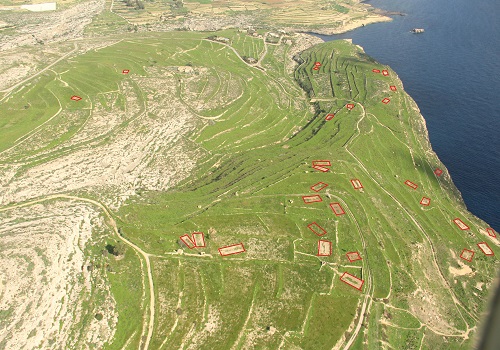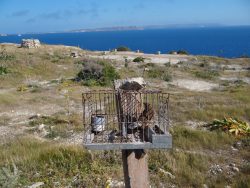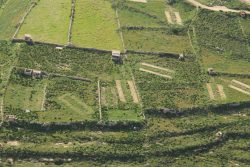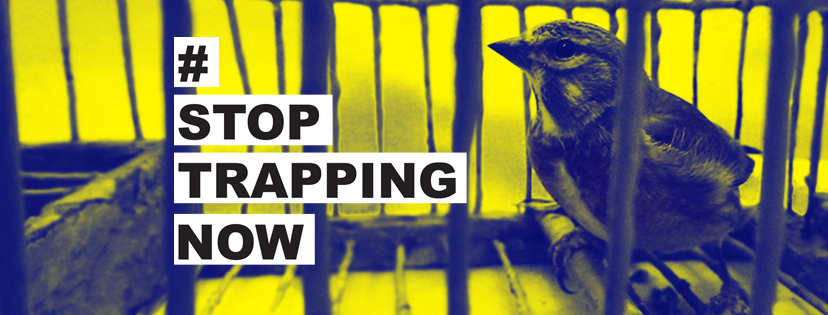The sprawl of trapping sites that has characterised trapping seasons over the past years has resulted in unaccounted destruction of pristine habitats, with little or no enforcement. This has been confirmed following various reports filed by BirdLife Malta requesting action over non-registered trapping sites over the past trapping seasons for which no action has resulted to date.

Aerial photo of trapping sites at Ta’ Ċenċ Natura 2000 site in Gozo (November 2017). In December 2016, BirdLife Malta reported these sites located within the Natura 2000 site to WBRU who confirmed a good proportion of these sites as not being registered and operating illegally. Despite reporting the matter, during the 2017 trapping season, these sites causing damage to habitats within the Natura 2000 site were still operative actively catching birds, with no apparent action taken by WBRU, Police or ERA. (Photo by BirdLife Malta)
According to legislation in force since 2014 – when the finch trapping derogation was coined by the Wild Birds Regulation Unit (WBRU) – trappers were allowed to register up to two sites per trapping licence where trapping sites could be set up.
The framework legislation permitting trapping of finches and of Song Thrush and Golden Plover, only allows for the re-activation of trapping sites if they have existed before 2012 (as seen from aerial photography), and were not located on protected habitats within Natura 2000 sites. The vetting process which was carried out solely by WBRU officials prior to trapping seasons has since then authorised up to 8,000 sites for each trapping season – an area larger than the size of Valletta.
Despite the fact that the Environment & Resources Authority (ERA) is the competent authority when it comes to the protection of land, WBRU has been the entity in charge of authorising this land use, with ERA only giving its go-ahead during Ornis Committee meetings, on the condition of enforcement being carried out by WBRU and police. During the Ornis Committee meeting on the 10th of May 2017, ERA voted in favour of a finch trapping season on the condition that “compliance and enforcement is guaranteed and implemented by WBRU and the police force”. However, despite queries sent over the years to all authorities to publicise the 8,000 plus locations where WBRU has authorised such trapping, the Environment Ministry has refused to divulge this information quoting privacy issues, with all other entities concerned with the enforcement namely ERA and the police redirecting such queries to WBRU.
BirdLife Malta refused access to data about more than 8,000 sites where trapping is authorised each year
According to the Aarhus Convention to which Malta is a signatory, all environmental data should be made public upon a request being filed. Despite this, WBRU has insisted that the data contains private information which cannot be divulged. Despite clarifying that the request concerns environmental land use data and not personal data, and that ERA and the Planning Authority (PA) themselves make information on conceded land use public (such as when a development application is filed), the WBRU within the Ministry for the Environment, Sustainable Development and Climate Change has kept refusing such data to be passed to BirdLife Malta, invoking the Information and Data Protection Commissioner to investigate the matter. In 2016, the Data Protection Commissioner backed the WBRU on their stance and currently an appeal to this decision is being contested by BirdLife Malta in front of the Information and Data Protection Appeals Tribunal.

Finch in a cage used as lure at one of the trapping sites at Ta’ Ċenċ Natura 2000 site. (Photo by BirdLife Malta)
This follows several reports BirdLife Malta made in 2016 to the WBRU regarding several trapping sites located in coastal areas and within Natura 2000 sites – locations which appeared to be on protected habitat scheduled by ERA. The WBRU had replied that indeed over 40% of those reported were not registered and the matter had to be passed on for enforcement action. No responses have yet been received from ERA over what enforcement action has resulted since the matter was reported in December 2016 and the environmental impact on these sites remains unknown.
“Here we have another clear case where the trapping derogation has failed miserably. Finch trapping re-opened in 2014 allowing a multitude of trapping sites to be re-activated and cleared with the authorities not having the capabilities of ensuring any strict enforcement. While the WBRU authorised sites, it was apparently up to ERA to enforce if these were not according to the rules. At the end of it, no authority has taken responsibility and nothing much happened, with the result being a multitude of legal and illegal sites along our coasts active each time a trapping season is opened,” remarked Nicholas Barbara, Conservation Manager at BirdLife Malta.
The situation is even worse in comparison to hunting in which members of the public may have the capability of distinguishing a protected species being shot and may report the matter to police. In the case of trapping sites however, such distinctions cannot be made. Hundreds of trapping sites and public pathways closed to the public can be encountered during a walk in the countryside and yet no information is available whether these sites are operating legally or otherwise. All of this suggests that even if a report was made about a site, two years down the line, these sites will still be possibly active.
Commenting on the current state with trapping seasons, BirdLife Malta CEO Mark Sultana stated: “information pertaining to where a public authority authorises private and public land to be used for trapping should be of public domain. Preventing such information being made public is tantamount to contributing to the mess of illegal trapping sites impacting our countryside,” insisted Mark Sultana.
A verdict on the appeal filed by BirdLife Malta to the Information and Data Protection Appeals Tribunal is expected in April 2018.
Read the Maltese version of the press release here.


